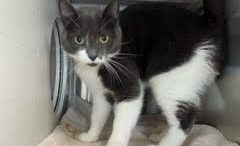The Venango County Humane Society wants to make sure people do the right thing this holiday season when it comes to pet adoption. A column on dog ownership shows that costs can quickly add up. Meanwhile, Regina Martin with Hog Heaven Rescue Farm provides some winter weather tips for animals. Plus, folks are reminded to license their dogs by Jan. 1.
A lifelong commitment
Venango County Humane Society in Seneca posted the following advice on its Facebook page for folks considering adopting during the holiday season.
“Pets are not presents. They are family members. Make choosing a new pet a family affair with much research, in person meetings and plans set for a lifetime of love,” the post said.
“If you know your loved one really wants the lifelong commitment of a new pet, talk to them first. Let them know you will pay the adoption fee from a rescue or go meet and save a life at a shelter,” the post continued.
“Go together and let them choose their new best friend for life. People need to meet their new pets and feel a connection. Please don’t make that choice for them,” the shelter posted.
Meanwhile, three-legged kitten Lt. Dan was adopted Dec. 16.
“Lt. Dan (our little kitten that came in with the injured leg that had to be amputated) found his loving family and home today! We’re happy for all of them and hope they have a wonderful life together,” the shelter posted on its Facebook page.
The Venango County Humane Society will observe the following holiday hours:
Saturday, Dec. 24 – noon to 3 p.m.
Christmas Day – closed
Monday, Dec. 26 – closed
The shelter will open for regular business hours from noon to 5 p.m. Tuesday, Dec. 27.
It is located at 286 S. Main St., Seneca. More information on the Venango County Humane Society is available by calling (814) 677-4040 or online at venangocountyhumanesociety.org.
What does a dog really cost?
By Cheryl Stritzel Mccarthy
You’ll have to buy kibble, a collar and a leash. That, plus the upfront cost of a new pup, pretty much covers it, right?
Not quite. Most new pet owners grossly underestimate what it actually costs to own a dog, say Wisconsin veterinarians Race Foster and Marty Smith, founders of the pet supply company Drs. Foster and Smith, on PetEducation.com.
Besides food and regular veterinary care, consider licensing, electric fences or regular fencing, home crates and travel crates, training and obedience classes, boarding, dog walking, dog-sitting, grooming, teeth cleaning, treats, toys, poop bags, flea/tick meds, heartworm meds, microchips and spay/neuter surgery, if your breeder didn’t provide it. Not to mention collateral costs such as carpet cleaning or replacement, ruined furniture, doors scratched, gardens unearthed, screens ripped or the extra deposit landlords require.
That’s if you have a healthy dog. Allergies, eye trouble and joint problems show up later.
The American Pet Products Association pegs the annual cost of a dog at $1,641. The American Society for the Prevention of Cruelty to Animals, ASPCA, says the annual cost is $695. Both agree first-year costs are higher.
Americans spend $23 billion every year on pet food, $15 billion on vet care and $2 billion on the initial purchase of all pets, according to the American Pet Products Association. The initial price of a dog ranges from $25 to $300, for an adoption fee for a rescue, to $3,000 and up for a specific breed.
A higher price can deliver a dog that costs less long-term. Tessa Rawitzer of Bellingham, Wash., spent $2,500 on an Australian labradoodle pup, named Arnold, three years ago. That included documentation that both parents were free of inherited defects, plus neutering, shots, deworming, a crate and a manual. The breeder was recognized by the labradoodle breed association and rated by the Better Business Bureau.
Rawitzer is hoping all that will mean fewer medical bills over the dog’s life. Her previous dog, an equally beloved rescue mutt named Jake, wound up costing much more. A 115-pound mix of German shepherd, Akita, and great Dane, Jake was running when he tore one knee ligament, then a few months later, the other. Surgery and follow-up care cost $8,000. Arthritis and other issues, with accompanying pain and meds, came later.
Rawitzer has had dogs all her life, usually rescues. This time, too, she went to the local humane society first. They had Chihuahuas and pit bulls, 6 months old, heredity and temperaments unknown. “I was not going to chance it,” Rawitzer said. “You don’t know what you’re getting.”
Lynn Barklage, of Lake St. Louis, Mo., got her 2-month-old Shih Tzu and cairn terrier mix, Sandy, from a pet store. At a regular six-month checkup, the vet noticed something odd about Sandy’s leg. A trip to a specialist confirmed a genetic bone problem. Choices presented to Barklage included surgery, at $1,500, or do nothing, which could necessitate amputation later. “She was young; she had her whole life ahead. And we loved her. She was a great dog.”
Surgery was the right decision, Barklage says, but recovery was stressful and time-consuming. The first stage, sedation and caging, lasted a month. “Sandy had to keep weight off her foot. She was either in the cage or sitting on my lap.” Recovery took another four weeks and required constant watching. “But she was worth every penny. Dogs are. She lived six years after that. Her (eventual) death was devastating to us.”
Barklage has not gotten another dog. “You never know what you’re going to get. Even a purebred has issues. Unless you’ve seen where the puppy was raised, you have no idea where it came from.”
New owners overlook the potential cost of accidents, Rawitzer says. Arnold, her labradoodle, at one point lapped up a tiny, tasty bristle that had fallen out of the barbecue-cleaning brush. An X-ray, treatment and follow-up X-ray came to $400. That accident happened during regular vet hours. The next time he ate something he shouldn’t have, it was during the weekend. That trip to the emergency vet resulted in a $1,200 bill.
New owners may not consider ongoing needs, such as boarding if they travel. Grooming averages $65 plus tip per monthly visit, more if the owner doesn’t keep up with regular brushing.
More important than expense, most new owners don’t realize the time a dog requires, says vet Michelle Schraeder, owner of Mountain Veterinary Hospital in Bellingham, Wash. That includes training, socialization with other dogs and people, and whatever it takes to ensure a decent home life. It’s not OK to let a dog roam the neighborhood or be tied to a chain.
Rawitzer, a lifelong dog owner now retired from a corporate job, agrees. “You need to walk your dog. It’s excellent exercise and socialization for humans too. It’s a good way to make new friends.
“Spend the time,” Rawitzer says. “You get back a whole lot of love.”
– Cheryl Stritzel Mccarthy is a writer for the Chicago Tribune.
Keeping them comfy in the winter weather
Regina Martin, of Hog Heaven Rescue Farm in Cochranton and former Venango County Humane Society officer, provided a few tips to help animals and their owners deal with the winter weather.
“Water is most important … and for hoofed animals, hay is what gives them their warmth … and shelter to get out of the wind,” Martin said.
“Blankets are not good for equine as it hampers their natural ability to grow a thick winter coat,” she added.
She said the state Department of Agriculture has researched and stated that cows do not need shelter. However, she said she doesn’t agree with this finding.
For dog and cats, if they cannot be indoors, shelter should be provided for them.
Dogs need a dog house that is well insulated and can have straw put in it, Martin said.
For cats, people can make houses from Styrofoam coolers or even sturdy coolers can be used. If they use plastic tubs and put Styrofoam coolers inside, they will need to fill the spaces in-between with straw… not hay, but straw, Martin said.
She provided a site with handy directions for making shelters: Here is the link alleycatadvocates.org.
“An outdoor cat house filled with straw — not hay — will keep your feline friends warm and cozy during the winter,” Martin added.
“The difference between straw and hay may seem mundane, but it can actually make a world of difference for cats. They look similar, but while straw makes excellent bedding for outdoor cat shelters, hay becomes a soggy mess,” she said.
Hay is typically used to feed animals, like horses. It soaks up moisture, making it cold and uncomfortable for cats — and has the potential to get moldy, according to Martin.
“And in the winter, a wet bed can even be dangerous, making cats more likely to get sick,” she said.
Martin said, straw, the dry leftover stalks from harvested crops, repels moisture, making it the best bedding for outdoor cat shelters. People should loosely pack the straw in the shelter to the quarter or halfway point.
“That’s it,” she said.
Martin added the easiest way to tell the difference between straw and hay is the price: hay generally costs two or three times more than straw. Straw is tough, thick, lightweight and yellow or golden. Hay is usually heavy and green, but there are varieties.
Martin said straw can be purchased at a variety of places including pet supply stores; farm, livestock, or agricultural supply stores/catalogs; garden centers and farmers (ask your neighbors). People can also ask their vet about local suppliers.
Martin said one tip is that straw usually comes in bales but people only need a fraction of that to line a cat house. She suggested keeping enough straw to freshen the shelter when the seasons change, keeping it clean and smelling good for the cats.
Straw can last for decades if stored properly. It should be stored in a dry place off of the ground.
‘Love Your Dog? License Your Dog’ by New Year’s Day
HARRISBURG — Agriculture Secretary Russell Redding reminded dog owners to license their dogs by Jan. 1 to give them the gift of security. State law requires dogs to be licensed, and licenses protect your pets if they get lost.
“While you’re shopping for the perfect chew toy for your dog’s holiday stocking,” Secretary Redding said, “Don’t forget to buy your dog a license before the New Year. … Licensing your dog is the best step you can take to bring your beloved pet home if he gets lost. It’s not only the smart thing to do, it’s also the law.”
State law requires all dogs, three months and older, to be licensed by January 1 of each year. Owners who fail to license their dogs could face a fine of up to $300 for each unlicensed dog.
The fee for an annual dog license is $6.50, or $8.50 if the animal is not spayed or neutered. Lifetime licenses are available for dogs that have permanent identification such as a microchip or tattoo. Older adults and persons with disabilities may be eligible for discounts.
The dog license application is simple. It only requests owner contact information and details about the dog being licensed, such as name, age, breed and color. The information is used by animal control and shelters to identify lost dogs and get them home safely.
Licensing fees support animal control through the Pennsylvania Department of Agriculture Bureau of Dog Law Enforcement, which is responsible for ensuring the welfare of dogs, regulating dangerous dogs and overseeing annual licensing and rabies vaccinations.
For more information, visit licenseyourdogpa.pa.gov or call the Bureau of Dog Law Enforcement at (717) 787-3062.
Venango County
The 2017 dog licenses are available at the Venango County treasurer’s office in the courthouse annex at 1174 Elk St. in Franklin.
In addition to the treasurer’s office, the Oil City Agway, the Venango County Humane Society and the Seneca Veterinary clinic also sell the licenses.
The licenses may also be purchased online using the Venango County website. There is a $1.95 convenience fee charged by the provider of the service and a 2.49 percent fee will be charged on purchases exceeding $78.
The application may also be downloaded and printed from the county website and completed and mailed — along with a check or money order payable to county treasurer — to Venango County Treasurer, P.O. Box 708, Franklin, 16323.
Clarion County
Clarion County dog licenses are available for purchase at the county treasurer’s office.
State law requires dogs age 3 months and older to have a license tag. Applications for the licenses are available at www.co.clarion.pa.us.
Licenses also may be purchased by sending a renewal card or completed application with check or money order to Tom McConnell, treasurer, at 330 Main St., Room 110, Clarion, 16214.
Helping hands needed
Clarion PAWS in Shippenville is looking for a few extra hands.
“The majority of our volunteers are college students. With them gone for the holiday we need more help. If you need a break from shopping, wrapping, or cooking please consider spending time with our feline residents. We can use volunteers any shift, from 5 to 7 p.m. Mondays through Thursdays and 1 to 4 p.m. Saturdays,” the rescue posted on its Facebook page.
Clarion PAWS is located at 11348 Route 322, Shippenville, Clarion River Hill, between Scrap Happy and Clarion Electric.
The adoption center is open from 5 to 7 p.m. Mondays through Thursdays and from 1 to 4 p.m. Saturdays.
The center is closed Fridays and Sundays. More information is available online at www.clarionpaws.org, the group’s Facebook page or by calling (814) 229-1231.
(All About Animals is a weekly blog that appears on Venangoextra.com and Clarionextra.com. Interested persons or groups can submit information to bigdogs.thederrick@gmail.com. Readers may also submit photos or stories of their animals to bigdogs.thederrick@gmail.com. More information about the blog is available by contacting Anna Applegate at 814-677-8364.)












































